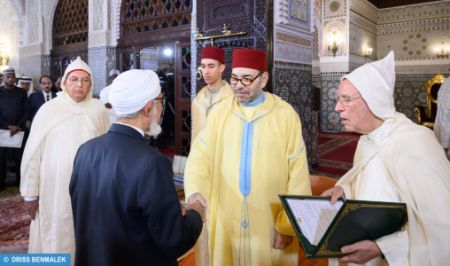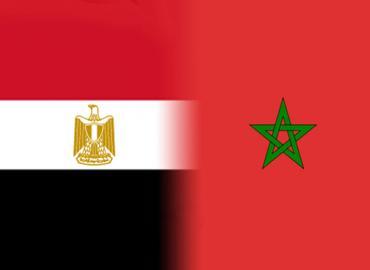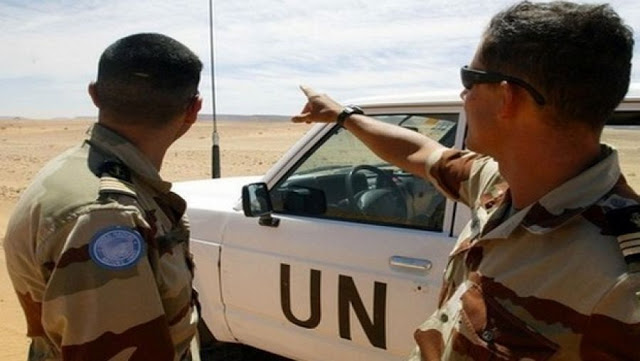“The importance of religious preaching and the place of preachers” was the theme of the second Ramadan lecture given in Rabat Monday under the chairmanship of King Mohammed VI, Commander of the Faithful, who was accompanied by Crown Prince Moulay El Hassan, Prince Moulay Rachid and Prince Moulay Ismail.
The lecture was given by Vice Chancellor of Darul Huda Islamic University in India, Bahaudheen Muhammed Nadwi, who underlined that it is the Almighty’s justice of clemency not to have left Men to their own devices, but sent them messengers and prophets to invite them to God. Likewise, scholars and Ulemas have been entrusted with this same mission of Da’wa to invite people to the oneness of God, devotion, and love of good for others.
The lecturer tackled four focal points, namely the Da’wa before the advent of Islam, the Da’wa to Islam as the Prophet (PBUH) did, the Da’wa in Muslim history, and the Da’wa in the contemporary context.
Muhammed Nadwi underlined that the Almighty sent prophets and messengers to human beings, and that the Holy Quran cited twenty-five messengers, all sent to their people in the area located in the Arabian Peninsula and Al Sham during the period ranging from Noah to the advent of Islam, including Ibrahim, Moses up to Jesus. In the laps of time between one prophet and another, there was a moment of indolence that required the advent of a new messenger, he explained.
The lecturer also highlighted the methods of contemporary preaching, both those described as traditional (collective oral preaching) or modern through the use of electronic media to guarantee their large-scale dissemination.
Tackling the incentives and obstacles to Da’wa, he raised the need for collaboration between followers of different religions to convince the irreligious of the merits of attachment to religion for the preservation of common human values, instead of competition and enrollment on the part of some faiths to the detriment of others, as well as the imperative of a consensus among Muslims to fight extremism and takfirism and respect for difference in jurisprudence between the various rites, as observed by the ancestors of the Umma.
The lecturer also stressed the importance of being convinced that individual and collective preaching should not be instrumentalized for non-religious purposes aimed at sowing confusion among people in the name of religion and that the preaching required in every era, especially today, shall be based on the civilizational example.
At the end of this lecture, the King, Commander of the Faithful, was greeted by Sheikh Moustapha Sonta, president of the Ivorian Section of the Mohammed VI Foundation of African Ulema and Caliph General of the Tidjanes in Côte d’Ivoire; Abdelhakim Mohamed El Aniss, chief researcher and member of the High Authority of Ulema at the Islamic Affairs and Charitable Activities Department in Dubai (United Arab Emirates); Abd Al-Fattah Bin Salih Qadish Al-Yafei, general supervisor of the Khairate center in Yemen; Abou Bakr Zoubeir Mbouana, president of the Tanzanian section of the Mohammed VI Foundation of African Ulema, Mufti of the Republic and president of the Tanzanian High Council for Islamic Affairs; and Ahmed Nour Mohamed Lahlou, member of the Chadian section of the Mohammed Foundation VI of African ulema and General Mufti of the Republic.
The Sovereign was also greeted by Akram Nadwi, Director and one of the founders of the Al Salam Institute in Oxford in Great Britain; Salim Alwan, Secretary General of Dar Al-Fatwa in Australia; Omarou Camara Abou Bakr, president of the Liberian section of the Mohammed VI Foundation of African Ulema and president of the National Muslim Council; Madhar Mohamed Al Hamoui, member of the Higher Islamic Council in Lebanon; Muhammad Al-Amine Touray, president of the Gambian section of the Mohammed VI Foundation of African Ulema; Salah Nday, president of the Central African section of the Mohammed VI Foundation of African Ulema; and Sheikh Mamadou Abudo Bachi, president of the Togolese section of the Mohammed VI Foundation of African Ulema.
At the end of this second religious lecture, the Minister of Endowments and Islamic Affairs presented to the King a facsimile of the manuscript “Dalail Al Khayrate” by Sheikh Mohamed Ben Slimane Al-Jazouli (857H/1453 G), on a calligraphy by Mohamed Ben Al Kacem Al Qandoussi Al Fassi (died in 1278H/1861 G in Fez).



